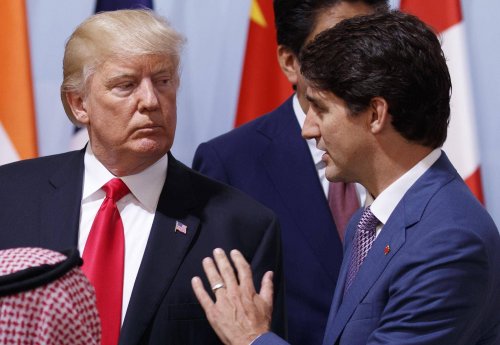The Guardian | 29 August 2018
Nafta betrayal points to bleak future for US-Canada relationship
by Ashifa Kassam
It’s a threat that has loomed since Donald Trump took power, bursting into view each time the US president attacks Canada’s trade policies.
But this week Canadians have been forced to confront the possibility of a breakdown in trade relations with their closest ally and biggest trading partner, after Trump announced a preliminary deal with Mexico.
The news left Canadians reeling and sent the country’s foreign minister rushing to Washington DC in the hope of salvaging the decades-old North American Free Trade Agreement (Nafta). The stakes for Canada are sky-high; the country sends three quarters of its exports south of the border while roughly 2.5m Canadian jobs depend on US trade.
If Canada fails to keep its place in the free trade bloc, the US might have to impose punitive tariffs on Canadian-made cars, mused Trump, breathing life into a scenario dubbed Carmageddon by Canada’s auto industry for the catastrophic job losses it could provoke.
“In essence, [prime minister Justin] Trudeau is being forced to negotiate with a gun to his head,” Meredith Lilly, a trade adviser to former prime minister Stephen Harper, wrote in an article for the Canadian Broadcasting Corporation. “There are a range of matters still to be resolved, but it seems as though there are no poison pills left — only bitter ones for Canada to swallow.”
Trump is pushing for a draft of Nafta to be completed by Friday in order to accommodate a 90-day waiting period under US trade law and push the deal through before an upcoming change in Mexico’s government.
The US president’s actions have left trade experts across North America divided, sparking debates as to whether the deadline set out by the White House is firm and whether the president has the authority to transform the trilateral agreement into a bilateral one.
Others have pointed to the upcoming midterm elections in the US, contextualising Trump’s announcement as political theatre aimed at reassuring his base and upping the pressure on Canada to acquiesce to US demands.
The result has been a tremendous amount of bewilderment over what, exactly, the Canadians can do this week as they sit down to negotiate the agreement. “If the mood prevailing in the Canadian camp in Washington could be summed up in a sentence, it would be: if you’re not confused, you’re misinformed,” noted National Post columnist John Ivison.
Canada’s foreign minister appeared upbeat on Tuesday, describing Mexico’s concessions on auto rules of origin and labour rights as a breakthrough. “We are optimistic about having some very good, productive conversations this week,” Chrystia Freeland, Canada’s foreign minister, told reporters.
Her office has shot down any talk of Canada being left out of the trilateral pact, seemingly siding with those who argue Trump does not have the authority from Congress for a bilateral deal. “Canada’s signature is required,” a spokesperson for Freeland said earlier this week.
Some pointed out that Ottawa has little other option. “Ottawa is putting on a brave face, to be sure, but what else can it really do,” asked David Rosenberg, the chief economist at Toronto’s Gluskin Sheff + Associates investment firm, in a morning note sent out Wednesday.
After an electoral campaign in which Trump repeatedly took aim at Mexico by campaigning to build a wall, cracking down on immigration and bringing in a steep border tax, his actions as president suggest that Canada – one of the few major economies that buys more goods and services from the US than it sells – is now firmly in the administration’s crosshairs. “It is very clear after the way Canada was ordered to stay home and not partake in the agreement just inked, that the USA under this Trump administration is no friend at all,” Rosenberg said.
Rosenberg also took aim at Mexico, pointing to the country’s role in catapulting Canada into its current situation. “The Mexicans … did a very good job of stabbing Canada in the back as well as backtracking on issues that it had previously agreed with Canada were non-negotiable,” he said.
Weeks earlier, Mexican officials had reassured Canada – which had been sidelined from Nafta talks for more than two months – that they would not cut a separate deal with the US. “What happened to that?” Rosenberg asked. “Gracias for nothing.”
For hyperlinks, read article on original page
